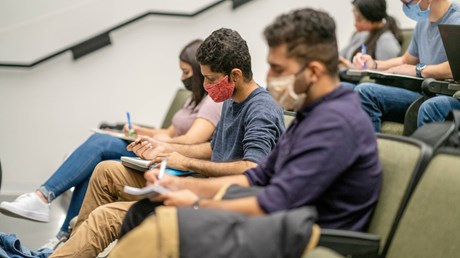Rates of anxiety and depression were on the rise before. Now counselors, students, chaplains, and professors alike are doing their part to help.

Before the pandemic, Meghan Becker would meet with five to seven students in crisis a week. As the director of Baylor University’s CARE Team, it’s her job to connect them with the right professionals and resources to address a range of issues, such as suicidal thoughts, depression, stress, drug use, or other troubling behavior.
The number of students coming to her doubled, then tripled by fall 2021.
“I feel like a care and compassion machine,” said Becker, after a week this semester where she saw 19 students in a row.
Her team at the Waco, Texas, campus started taking two work-from-home days a week as a way to help protect their own mental health and workload while bearing the weight of students’ plights during the pandemic.
The dramatic spike in mental health challenges amid the spread of COVID-19 has overwhelmed counselors and chaplains at Christian colleges across the country. But this moment has also led to a deeper understanding of the burdens students carry and more resources on campuses to help.
A growing number of college students were feeling strained prior to March 2020, but once the coronavirus hit—bringing fear, stress, loneliness, and an unknown trajectory for the future—schools saw record-high requests for counseling support. Many added remote options, sometimes even 24/7 availability, to meet students’ needs.
A year and a half into the pandemic, campus staffs are managing the higher demand for counseling requests as more students returned in person this fall.
Baylor’s CARE Team experienced a 110 percent increase in counseling cases over the pandemic. Student counseling appointments were up 73 percent at Biola University in La Mirada, California.
In an informal ...
Continue reading...umn ministry
from Christianity Today Magazine
Umn ministry


.gif)

.gif)
.gif)
